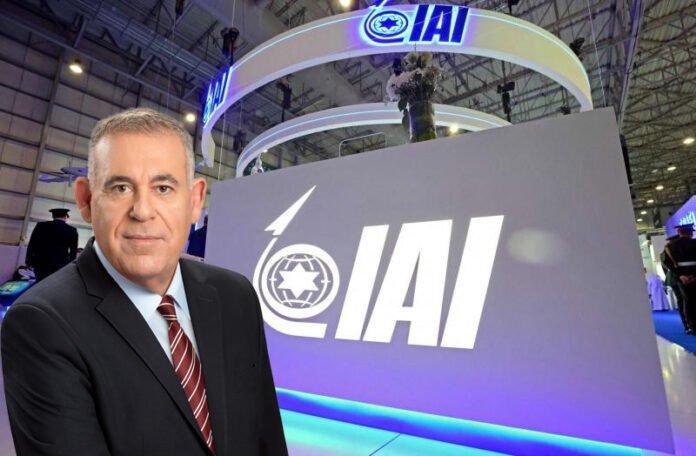The integration of artificial intelligence (AI) and satellite swarms is redefining modern warfare, offering unprecedented real-time intelligence and operational capabilities. As global defence strategies evolve, cutting-edge technologies like autonomous platforms and AI-driven data processing are becoming critical tools for nations facing complex security challenges. For Israel, these advancements are vital as the country navigates shifting threats and seeks to maintain its technological edge.
In this exclusive interview with Arie Egozi for Raksha Anirveda magazine, Boaz Levy, President and CEO of Israel Aerospace Industries (IAI), provides insights into how satellite swarms, AI, and autonomous systems are transforming Israel’s defence infrastructure.
RA. Your company is focusing on satellite swarms and AI-based data processing as part of its highest priority areas. Can you explain how these systems will enhance battlefield intelligence?
BL. Absolutely. The use of satellite swarms combined with AI-based data processing is at the core of one of our most significant projects. These satellite swarms will provide vast amounts of raw data collected from various combat zones. The AI systems we are developing will then process this raw data, converting it into actionable intelligence. This will allow every combatant on the battlefield to access real-time updates on evolving threats. The AI will identify immediate dangers and deliver critical information, ensuring soldiers can respond effectively and swiftly. This integrated approach is crucial for modern warfare, where the speed of information can determine success or failure.
RA. These systems sound highly advanced. Can you provide more details on the development process, and how the Israeli Defence Forces (IDF) will benefit from them?
BL. While much of this programme is highly classified, what I can say is that it will significantly enhance the capabilities of the IDF to deal with threats, particularly large-scale missile and drone attacks. For instance, the missile and drone assault by Iran on April 14, 2024, saw a significant number of projectiles aimed at Israel. Our systems will make it easier to detect and neutralise such threats by providing the IDF with timely intelligence. This includes not only aerial threats but also potential dangers from land and sea.
RA. IAI is also working on autonomous systems. Can you elaborate on the development of autonomous ground platforms?
BL. We are indeed working on autonomous ground platforms, which are systems designed to operate with minimal human intervention. However, we always keep a “man in the loop” to ensure human oversight in critical decision-making. These platforms are being developed to handle various battlefield tasks autonomously, reducing the need for constant human control and allowing soldiers to focus on strategic decision-making.
IAI’s space directorate is also focusing on the development of micro and nano satellites, which will play an integral role in this broader network of intelligence gathering.
The satellite swarms supply raw data, while AI-based systems process it into actionable intelligence, identifying immediate evolving threats to be addressed in real time. This technology is a game-changer for battlefield operations.
RA. Can you tell us more about how these satellite swarms will operate with AI to assist individual soldiers?
BL. Certainly. The images and data collected by satellite swarms, as well as other sources like ground, air, and maritime units, will be processed using highly sophisticated AI algorithms. These algorithms are designed to sift through massive datasets and deliver only the most relevant and timely information to each soldier. Whether it’s identifying enemy movements or potential threats, the AI system will ensure that soldiers are not overwhelmed by data but are instead equipped with actionable insights in near real-time. This technology is transformative and will give our forces a substantial advantage in future conflicts.
RA. The events of October 7, 2023, when Israel was attacked, seem to have shifted the priorities of the IDF. How will this event reshape the Israeli defence sector?
BL. The attack on October 7, 2023, has indeed highlighted certain vulnerabilities and exposed areas for improvement. The IDF is undergoing a thorough review to address the gaps in readiness for unconventional threats. The overhaul will likely focus on integrating advanced intelligence, surveillance, and reconnaissance systems, such as the ones IAI is developing. This includes leveraging AI to process data faster and more accurately, providing more precise battlefield information, and enabling quicker responses to evolving situations.
RA. Let’s shift to Israel’s Foreign Military Financing (FMF) programme with the United States. How does this programme affect the Israeli defence industry?
BL. The FMF programme is essential to Israel’s defence capabilities. It allows Israel to procure certain defence systems and products from the United States, which strengthens the collaborative defence relationship between our nations. However, it is crucial for Israel to maintain its own independent defence technology development. The current conflict has underscored the importance of this dual approach. While collaboration with the US via FMF is invaluable, Israel must also invest in home-grown technologies to ensure long-term security and innovation.
RA. Recent conflicts, such as the war in Ukraine and Israel’s ongoing war, have highlighted the importance of certain defence technologies. Which technologies do you believe will receive more attention as a result?
BL. We no longer focus on specific technologies in isolation. Instead, we aim to offer our clients holistic, operational solutions. This means integrating a variety of technologies—whether it be AI, satellite communication, or autonomous systems—across air, sea, land, and space. The goal is to provide a comprehensive solution that addresses all operational needs, not just isolated technological advancements. Our clients understand that the future of warfare requires this level of integration.
RA. IAI had a record-breaking year in 2023. How do you maintain momentum in the face of increasing competition from countries like Turkey and the United Arab Emirates (UAE), who are rapidly expanding their defence sectors?
BL. We don’t focus on competition as much as we focus on delivering the best solutions for our clients. Yes, countries like Turkey, with its focus on Unmanned Aerial Vehicles (UAVs), and the UAE, with its Edge Consortium, are growing rapidly. However, Israel Aerospace Industries adheres strictly to the export guidelines set by the Israeli Ministry of Defence. These guidelines ensure that our exports align with Israel’s security interests. I would also point out that our engineers, who serve in military reserve units, bring a unique operational perspective to their work. This hands-on experience gives us a distinct advantage in developing systems that are tailored to real-world combat needs.
IAI is developing autonomous ground platforms, using advanced AI algorithms to gather and process near real-time data. These systems offer comprehensive operational solutions for air, sea, land, and space defence, providing the IDF and international clients with cutting-edge technology.
RA. The war on October 7 revealed significant challenges in Israel’s ammunition reserves. How has IAI managed to meet both IDF’s urgent needs and its international export commitments?
BL. From the moment the war broke out, IAI has been working around the clock to ensure that we meet both the IDF’s needs and our commitments to international customers. We have not delayed any of our export deliveries. For example, the Arrow 3 interceptor, ordered by Germany, played a critical role during the war and has proven its effectiveness in defending Israeli airspace. We have been able to manage our resources efficiently, ensuring that we continue to meet the IDF’s requirements while fulfilling our international contracts.
RA. Global supply chain disruptions have affected many industries, including defence. How is IAI managing these challenges?
BL. Like many other companies, we are facing supply chain disruptions, but IAI’s engineering capabilities have allowed us to mitigate these challenges significantly. In some cases, we have even developed in-house substitutes for components that are no longer available from international suppliers. Our efforts to address supply chain issues have been 99 percent successful, which has allowed us to continue delivering systems on time.
RA. IAI remains a state-owned company, despite numerous attempts at privatisation. Do you believe privatisation would benefit IAI?
BL. I strongly believe that partial privatisation would be highly beneficial for IAI. In today’s global market, flexibility is crucial for any company to stay competitive. However, I think it is important that the Israeli government retains a 51 percent stake in the company. This would give IAI the necessary commercial flexibility to compete effectively while ensuring that Israel’s national security interests remain protected.
-The writer is an Israel-based freelance journalist. The views expressed are of the writer and do not necessarily reflect the views of Raksha Anirveda






